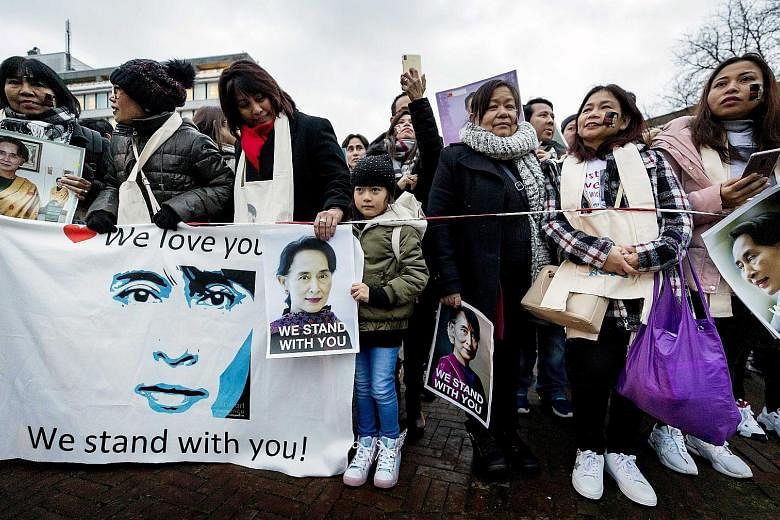Denying that Myanmar had genocidal intent in its treatment of the Rohingya people, its de facto leader Aung San Suu Kyi yesterday urged the International Court of Justice (ICJ) in The Hague to let her country's justice system run its course.
"Can there be genocidal intent on the part of a state that actively investigates, prosecutes and punishes soldiers and officers who are accused of wrongdoing?" she asked at the world court, while presenting her opening statement, on the second day of public hearings related to Gambia's lawsuit alleging Myanmar had breached the 1948 Convention on the Prevention and Punishment of the Crime of Genocide.
Carefully avoiding the word "Rohingya", Ms Suu Kyi said Gambia has given "an incomplete and misleading factual picture". She referred in her half-hour speech to the ongoing work of Myanmar's appointed Independent Commission of Enquiry, which last month said it had interviewed some 1,500 witnesses, and was also speaking to policemen and soldiers who were at the scene in 2017. The military last month also opened a rare court martial probe to the public.
"It cannot be ruled out that disproportionate force was used by members of the defence services in some cases in disregard of international humanitarian law," Ms Suu Kyi said.
Soldiers found to have committed war crimes would be prosecuted under Myanmar's military justice system, she said.
"Such conduct, if proven, could be relevant under international humanitarian law or human rights conventions, but not under the 1949 Genocide Convention."
She acknowledged that sometimes military justice was rolled back, such as when seven soldiers were sentenced to 10 years' jail last year for the killing of Rohingya in a village, but pardoned just eight months later. "Many of us in Myanmar were unhappy with this pardon," she said.
Ms Suu Kyi warned "impatient international actors" against trying to leapfrog Myanmar's domestic justice system.
The suggestion that no accountability can be achieved through Myanmar's military justice system, she said, "undercuts painstaking domestic efforts relevant to the establishing of cooperation between the military and the civilian government in Myanmar, in the context of a Constitution that needs to be amended to complete the process of democratisation".
Myanmar's military drafted charter reserves a quarter of all Parliament seats and three key ministerial portfolios for military appointees. Its armed forces operate with little civilian oversight.
Yesterday's ICJ hearing was about provisional measures that Gambia had requested the court to order. These included preventing the destruction of evidence of the alleged genocide, as well as what the African country has called the ongoing genocide against some 600,000 Rohingya Muslims who remain in Myanmar under precarious circumstances.
About 700,000 Rohingya fled to neighbouring Bangladesh after an attack by Rohingya insurgents in 2017 triggered a military crackdown that international investigations have likened to ethnic cleansing. Naypyitaw does not recognise the Rohingya as an ethnic group.
Myanmar has been criticised for denying access to international investigators and for convening its own commissions that observers say are toothless.
Pinpointing the role of Myanmar military leaders in the Rohingya issue, the United States on Tuesday toughened sanctions against army chief Min Aung Hlaing by freezing any assets he had in the US and making it illegal for anyone in the US to make a financial transaction with him. The same sanctions were applied to three other senior military commanders.

